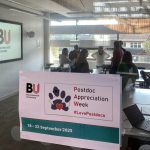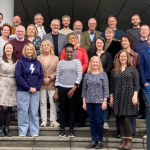This week is UK Postdoc Appreciation Week and we are celebrating and showcasing the achievements of our postdoctoral researchers and their important contribution to research at BU.
Today’s post is by Dr Aralisa Shedden, who writes about her experiences as a postdoctoral researcher…
I am a terrestrial ecologist who aims to understand the emerging challenges for biodiversity conservation in a changing world. I obtained my BSc and my MSc at the University of Veracruz, Mexico. My MSc thesis investigated sustainable use of tropical forest fragments to enhance biodiversity conservation and how endangered species adapted to changes in their environment. I also worked as a Research Assistant at the Institute of Neuroethology, where I supported research development and management.
I was then invited to join the Center for Tropical Research at the University of Veracruz, where I worked as a Scientific Associate until 2012, when I began my PhD at Bournemouth University. I completed my PhD in 2016 and my thesis combined environmental, ecological and social data to rank the suitability of areas for conservation in a multi-user and multi-use landscape in Mexico. I explored using primates as flagship species to establish these conservation sites and also aimed to support decision making and planning in response to threats including agriculture and hunting.
After a five year break in my career due to full-time care responsibilities, I re-joined academia and began a Post Doctoral position at Bournemouth University working on a EU Horizon 2020 project called RESONATE that investigates how past and current site factors and management affect forest system resilience in different forest types and management systems across Europe.
I also continue to collaborate with colleagues from universities in Mexico and the U.S.A. on topics related to interactions between wildlife (e.g. jaguar and puma predation on primates), the effects of landscape transformation on animal health (e.g. increase in parasitism in animals living in human impacted forests) and enhancing our knowledge on how to tackle conservation issues in the tropics.
Through my applied research, I am driven to understand the intricate relationships between the need for economic growth in rural communities and the necessity for environmental conservation. I am interested in how species respond to changes in their ecosystems, ongoing climatic events and human pressures. With this knowledge, I aim to provide practical solutions for conservation under varying scenarios.
For me, the best part about being a post-doc has been learning new skills and being exposed to topics/concepts that I had not been involved with in my previous research. And worst thing about being a post-doc is it can be somewhat isolating and the learning curve can be steeper than expected, which can be quite challenging.
If you’d like to write a blog post to share your experiences, or show your appreciation for our postdoctoral researchers, please contact research@bournemouth.ac.uk. You can also get involved on social media during Postdoc Appreciation Week by using #LovePostdocs and #NPAW2023 on Twitter and Instagram and tagging us @BU_Research or @UK_NPAW.
 Postdoc Appreciation Week: Postdoc Appreciation meet-up
Postdoc Appreciation Week: Postdoc Appreciation meet-up Postdoc Appreciation Week: Dr Rejoice Chipuriro
Postdoc Appreciation Week: Dr Rejoice Chipuriro Postdoc Appreciation Week: Local Authority Adult Social Care Recruitment and Retention research project
Postdoc Appreciation Week: Local Authority Adult Social Care Recruitment and Retention research project










 Missing Persons Indicator Project Recruitment
Missing Persons Indicator Project Recruitment Celebrating our Research: Postgraduate Research Showcase 2026
Celebrating our Research: Postgraduate Research Showcase 2026 Nursing Research REF Impact in Nepal
Nursing Research REF Impact in Nepal Fourth INRC Symposium: From Clinical Applications to Neuro-Inspired Computation
Fourth INRC Symposium: From Clinical Applications to Neuro-Inspired Computation ESRC Festival of Social Science 2025 – Reflecting back and looking ahead to 2026
ESRC Festival of Social Science 2025 – Reflecting back and looking ahead to 2026 3C Event: Research Culture, Community & Cookies – Tuesday 13 January 10-11am
3C Event: Research Culture, Community & Cookies – Tuesday 13 January 10-11am ECR Funding Open Call: Research Culture & Community Grant – Application Deadline Friday 12 December
ECR Funding Open Call: Research Culture & Community Grant – Application Deadline Friday 12 December MSCA Postdoctoral Fellowships 2025 Call
MSCA Postdoctoral Fellowships 2025 Call ERC Advanced Grant 2025 Webinar
ERC Advanced Grant 2025 Webinar Horizon Europe Work Programme 2025 Published
Horizon Europe Work Programme 2025 Published Update on UKRO services
Update on UKRO services European research project exploring use of ‘virtual twins’ to better manage metabolic associated fatty liver disease
European research project exploring use of ‘virtual twins’ to better manage metabolic associated fatty liver disease